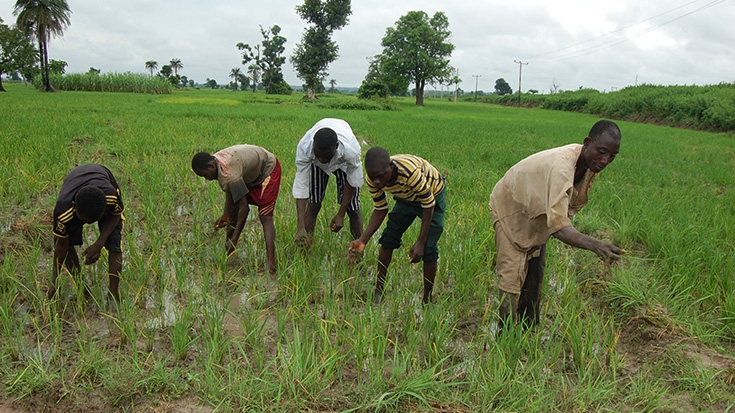To what extent would the government in Nigeria be attacking the unemployment crisis in the country should it adopt the strategy of state farms? State farms could be problematic but could be a helpful response to the kind of large scale unemployment as well as food insecurity in Nigeria today. What would be the advantages and the problems to expect as to decide whether it is a magic solution or a roadmap to disaster?
Two persons speak on this question to Intervention. The first is Dr Danbala Danju, the Managing Director of the Bank of Agriculture, with headquarters in Kaduna. The second is Mallam Yunusa Zakeri Y’au, the Executive Director of the Centre for Information Technology and Development, (CITAD), Kano. In other words, this interview is posting the views of the agricultural establishment and that of the civil society on the issue. While Danju combines in himself the academic, banker and international development expert, Mallam Y. Z Y’au is an academic, information technology expert and international development practitioner.
Both respondents have no reservations against the strategy but while Y’au sees the problem in the political consciousness and praxis of the power elite, Danju sees it in terms of plausible problems that could undermine it.

Chief Audu Ogbeh,Agric Minister

Dr Danbala Danju,MD,Agric Bank

Peasant Women on a farm somewhere in Nigeria

Picture of action on a World Bank assisted Fadama Project
Danbala Danju
Would you consider state farms as a proper response to the current crisis in terms of unemployment and food insecurity?
There are governments such as that of China that have been successful with state farms. That is the idea of organising production for common good. That’s fine but it has been a long debate here around privatisation and property rights. And the dominant framework now questions the idea of the state trying to organise production and, instead, emphasises private entrepreneurs. So, it has been a move towards private sector primacy in terms of the policy framework.
Is Nigeria where it should interrogate that policy framework now, especially on unemployment?
It could respond to unemployment but at what cost. I think that is what that policy framework would ask. It is no use to be pessimistic but we need to reckon with possible challenges, with ideas that need to be subjected to further analysis. The public service is associated with some problems such as siphoning away what belongs to the government, inflating contracts and generally exploiting everything that is government until everything is grounded. Imagine how much the agric bank has given out but which the beneficiaries never paid. So, if you go back to state farms, the contractors, the civil servants may be seeing it otherwise. So, there could be problems.
Is there a way of synthesising your point that it could work but there are foreseeable problems?
The thinking as I can see it is going for land banks rather than full throttle state farms. That means the government clears land for crops and loan to farmers as co-operatives and then these farmers decide. The key question is land access.
How far would this respond to the current crisis?
The issue is if you are dealing with a typical graduate today, you need to retrain all of them. They need credit to buy inputs, they need extension services, storage facilities and they would need market. How much of salary do you give to them on a state farm? If you know the political economy of the country, you need to bother if people would be able to buy their products. That is if the products would be harvested at the right time, stored well and sold. Can you get the civil service to organise and supervise this? That’s the big question.
The assumption is that when you have food insecurity and unemployment on the scale we have now, you must do unusual things. And state farms is one such things with particular reference to unemployment.
You want to do state farms. The first point is that state governments own the lands. Indigeneity comes in. Certificate of ownership comes in. Large parcels of land are needed. You need to prepare it. You need money and tractors, especially in forested areas such as Akwa Ibom, Cross Rivers and the others. We have to decide what would be the salary of the graduate farmer. Is it 30, 000 Naira per month or what? You need accommodation, you need to arrange their feeding, you need equipment, you need a farm manager to motivate them to wake up on time and all those. That is why policy community would ask, reducing unemployment but at what cost?
Why should organising and motivating be such big problems when in some countries, even private entrepreneurs have dormitories for workers and we would all agree that most Nigerians live in conditions worse than these dormitories.
That’s possible. The problems are not beyond being overcome. Probably, we can start from a pilot level to experiment on how the issue of corruption will be mitigated, how the students would be organised, how we would make sure the right managers are appointed and if we would resist the temptation to go on prolonged holidays, resolve salary issues and so on. Because that is important. You can see that even drugs for emergencies are stolen. And fake ones are supplied. You may also say, ok, let’s start from schools and ask schools to grow their food. Give them inputs such as tractors, fertiliser and let the principal supervise it even as you hear of erasers, chalks and pencils stolen from schools. It is complicated all over. The other possibility is the military and the police can be given land to produce. They have discipline. But they may argue that it would amount to re-conceptualisation of defence because hunger is not a security issue in defence sense.
Is there anywhere a variant of state farms operates now in Nigeria?
There are very few cases. Some universities have tried experimental farms. I think Abeokuta tried.
Y Z Y’au
State farms used to be one way of approaching the transformation of agriculture. How relevant do you consider it to Nigeria’s current situation?
If the government is serious, it is something they can think about. Part of the crisis of farming in Nigeria is the traditional system of land ownership. It is such that every generation has less land available because the land available to the head of every household is shared by all his farming children at his death. So, if he had ten children, the land available to each of them is just one-tenth of what their father had and it goes on like that. Against this background, all the major approaches to agricultural production are in trouble. One is grouping farmers together to buy tractors, etc with a view to increase production, then you have mechanized farming approach and then you have state farms.
We hear them talk about co-operatives in agriculture as well as mechanized farming, as inconsistently as it comes but we don’t ever hear of state farms as an answer to the crisis. Why might that be so?
Yes, when government itself talks about agriculture, it is always about procuring inputs but without talking about the land tenure system. When this is connected with the possibility of state farms, it becomes part of the contradiction of the way the ruling class looks at the peasantry. They think that any attempt to get peasant farmers into state co-operatives will be resisted. For that reason, nobody is talking about that. If you take the PRP in the late 1970s, they were more interested in protecting peasant farmers. Protecting peasant farmers was seen as more revolutionary than increasing food production and stopping hunger. That mentality is still dominant. There is a populist idea about protecting peasants where it is not the fear of their revolt. Governments find it easier to use the law of ‘No work, no pay’, for example, to control workers but that is not applicable to peasants. So, they don’t want to get involved. It also ties into a third problem with the image of state farms as forced labour, as repression such as we saw in collective farms in Russia in those days.
Can it help us in Nigeria today?
If agriculture is taken within a framework of systematically social transformation, doing something like that would address two fundamental problems. One is to absorb much of the teeming unemployed youths and second is how it would enhance food security at the same time that you make agro-aided industrialisation inevitable, whether you like it or not.
So, why is it not coming up?
It probably has to do with what people in the policy making arena understand by state farms. State farms have been equated with authoritarian systems. At a time of democracy and free choice, it could be a sensitive thing. Secondly, I have mentioned the fear of peasant revolt because they are not like workers whose unions operate under laws which the state can invoke. There will be anarchy once you have generalised peasant revolt.
Is it the peasants our policy makers fear or their patrons outside the country?
Well, eh! I am not sure about who they fear more. It would seem their patrons enjoy the current situation. There is food insecurity, forcing us to import from there. The current situation favours them although I still think that the problem lies more with persistently having governments in Nigeria that prefers not to rock the boat, so to say. It seems to me that their belief is, ‘Don’t rock the boat, let’s not get involved in complicated issues’. I do not think any government in this country is determined to address fundamental questions. They go round problems without confronting them.
What do you perceive would be the reaction of peasants to such a move now?
They would naturally oppose it but they can be won over by a government they see as honest. Their reaction will be negative but they can be won over because they can sense that they are utterly vulnerable. Within three months, most of them have exhausted what they produce and they start resorting to coping strategies, some of it communally integrative but most dangerous to their health and to security of society. So, it can be rationally explained to them. The problem again is that the government does not engage with them in any serious ways. What they assume is totally different from what obtains about the peasants. For instance, they assume that peasants would object to population check. Yes, it is true they want more hands for farm products. And because this also finds religious grounds because the Holy Book says God said, ‘go and multiply’. But they will understand the point that God did not mean that we should produce drug addicts, murders and armed robbers. And these are what you have when you produce children but cannot take care of them, push them as burden on the society and thereby open them to temptations to crime and dangerous things. Secondly, you cannot stop peasants from producing more children because the child mortality rate is so high that they see the answer in producing as many, hoping that some would survive. So, the issues have to be understood holistically, not mechanically. But certainly, peasants are reasonable and they know an honest explanation and they will follow you if they see that honesty.
Can mechanized agriculture help us now?
Even mechanized agriculture can only work if you change the land ownership system. If you check the experiments in places like Kebbi, Jigawa, Nasarawa states where the previous governments parcelled lands to Dangote to do mechanized farming, that became election issues. Those governments were accused of giving peasant lands out.
So, what happens in the circumstance?
State farms is the easiest thing to do as of today than mechanized farming because, that way, the farmers remain on the land, they retain their romantic ties to the land and you don’t risk anything. Problems come once land is taken away and given to a third party. Under state farms, you also get your enhanced food production. Even if you would go into mechanized farming, it is easier to go through state farms because the peasants would have understood and become accustomed to the different dynamics involved.
What last statement would you want to make?
The government has come out with its agricultural roadmap. There is no mention of anything such as state farms there. It might be good for the Minister of Agriculture to take another look and see whether there is room for state farms in view of the serious agrarian crisis in the country. They need to look at land ownership. I don’t think our agric policy for a long time has done a serious review of land ownership. That should be the starting point. There is real land hunger in this country. Nobody is addressing that. It is assumed that everything is normal. We have to go beyond talking about inputs because the question now is where is the land to absorb the inputs?



























